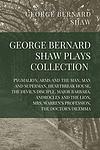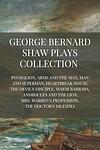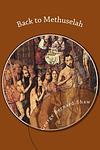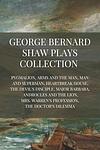George Bernard Shaw
George Bernard Shaw was an Irish playwright, critic, polemicist, and political activist. Born on July 26, 1856, in Dublin, Ireland, Shaw moved to London in 1876, where he established himself as a leading playwright of his era. He wrote more than 60 plays, including major works such as 'Man and Superman,' 'Pygmalion,' and 'Saint Joan.' With a penchant for societal critique, his works often include themes of social injustice and the need for progressive change. Shaw was awarded the Nobel Prize in Literature in 1925. He passed away on November 2, 1950, at the age of 94.
Books
This list of books are ONLY the books that have been ranked on the lists that are aggregated on this site. This is not a comprehensive list of all books by this author.
-
1. Pygmalion
"Pygmalion" is a play that explores the transformative power of education and the nature of language and communication. It follows the story of a cockney flower girl named Eliza Doolittle who is taught to speak and behave like a duchess by a pompous phonetics professor, Henry Higgins. Throughout the process, Eliza develops self-respect and personal dignity, challenging the Victorian society's rigid class system. The play also questions the idea of 'making' someone and the moral responsibility that comes with it.
-
2. Selected Plays of George Bernard Shaw
This collection features selected plays by a renowned playwright, showcasing his wit, social criticism, and talent for character development. The plays touch on a wide range of themes, including class struggles, the complexities of love, the absurdity of war, and the pursuit of individual freedom. The author's sharp dialogue and satirical approach make these plays both entertaining and thought-provoking, reflecting his progressive views and his belief in the potential for societal change.
-
3. Saint Joan
This play is a dramatic depiction of the life and trial of Joan of Arc. The narrative follows the young, illiterate peasant girl who claims to hear voices from saints, guiding her to lead France to victory against England in the Hundred Years' War. Her success on the battlefield eventually leads to her capture and trial for heresy. The play explores themes of individualism, faith, and the corruption of institutions.
-
4. Major Barbara
The play explores the complex dynamics of social responsibility, morality, and religion through the lens of an idealistic young woman who works at the Salvation Army to help the poor, and her father, a wealthy munitions manufacturer. The conflict between their worldviews comes to a head as they debate the ethics of wealth and charity, with the father arguing that his business, which provides employment and security, is a greater force for good than charity work that merely alleviates the symptoms of poverty. The daughter's struggle with reconciling her moral convictions with the practicalities of the world leads to a profound examination of the true meaning of goodness and the source of societal change.
-
5. Heartbreak House
Set against the backdrop of pre-World War I Britain, the play unfolds in the eccentric household of Captain Shotover, an old sea captain turned inventor. The narrative explores the lives and loves of the inhabitants of the so-called "Heartbreak House," who represent a microcosm of British society at the time. As they engage in witty banter and romantic entanglements, the characters remain blissfully unaware of the looming external threats that will soon engulf Europe. The play serves as a social critique, highlighting the idle, ineffective intellectualism and lack of moral direction among the British cultural elite, which Shaw saw as contributing to the country's decline and the catastrophic war on the horizon.
-
6. Candida: a Pleasant Play
This play revolves around the love triangle between a clergyman, his wife, and a young poet who idolizes her. The clergyman, who is a popular Christian Socialist, is oblivious to the poet's infatuation with his wife. The poet eventually confesses his love and proposes a "bidding" for Candida's affection, where both men will state their cases as to why she should choose them. In the end, Candida chooses her husband, stating that he is the one who truly needs her.
-
7. Major Critical Essays
This collection of essays showcases the author's incisive wit and profound critical thinking as he delves into a variety of subjects, ranging from the intricacies of Shakespearean drama to the social responsibilities of the artist. The author's articulate and often controversial opinions challenge the status quo and provoke readers to reconsider their preconceptions about literature, theater, and society. His essays are celebrated for their intellectual rigor, humor, and the author's unwavering commitment to social reform, making them an enduring contribution to literary criticism and cultural discourse.
-
8. Back To Methuselah
"Back to Methuselah" is a collection of five plays that span from the Garden of Eden to the distant future, exploring themes of longevity, evolution, and human development. The work presents a philosophical examination of the human condition, with characters that live for centuries, allowing the author to critique the social and political norms of different eras. The central idea is that humans must willfully evolve to achieve longer lifespans, greater wisdom, and a more profound understanding of their potential. Through a blend of comedy, drama, and speculative thought, the plays challenge readers to consider the possibilities of human progress and the necessity of embracing change for survival.
-
9. Man And Superman
"Man and Superman" is a philosophical drama that delves into the complexities of human evolution, social mores, and the eternal battle between the sexes. The play centers around the character of Jack Tanner, a radical thinker and advocate of free love, who finds himself the unwilling target of the determined and romantic pursuits of Ann Whitefield, a clever young woman who seeks to marry him. Through witty dialogue and engaging characters, the play explores themes of love, politics, and the purpose of human existence, culminating in a fantastical third act set in Hell, where characters debate the nature of reality, morality, and the superman, the Nietzschean ideal of a self-overcoming individual.








